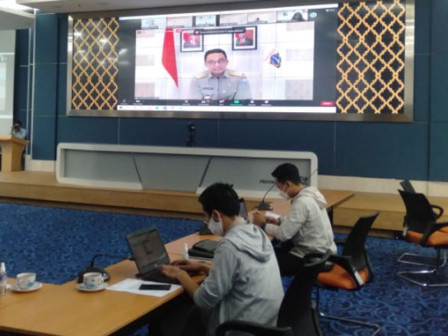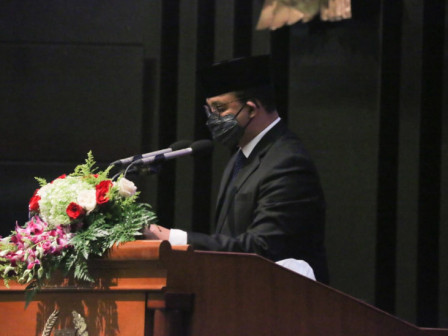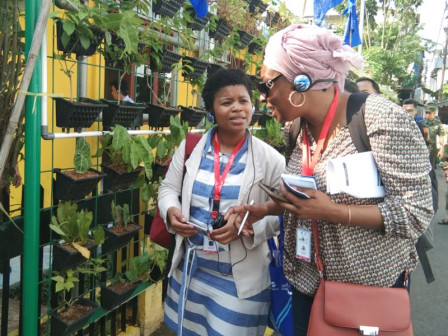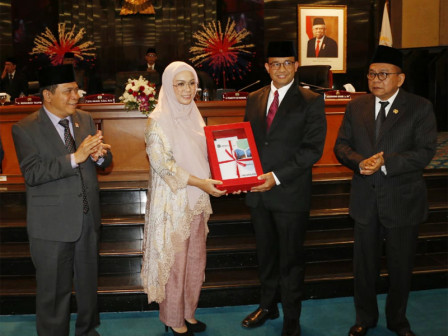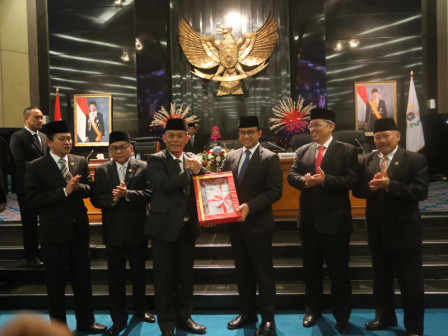Governor Opens Musrenbang for 2017-2022 RPJMD Amendment Virtually
Reported by Rezki Apriliya Iskandar | Translated by Nugroho Adibrata
We must anticipate not only solving today’s crisis and thinking what we have to do after this pandemic
Jakarta Governor Anies Baswedan, opened the implementation of the 2017-2022
Regional Development Planning Forums (Musrenbang) for the 2017-2022 mid-term regional development plan (RPJMD) Amendment virtually, on Tuesday (12/22).
Raperda APBD 2021, City Prioritizes to Overcome COVID-19 PandemicIt was carried out because of the COVID-19 pandemic disaster, so it required the development of a vision to be relevant to conditions during and post-pandemic.
"We must anticipate not only solving today’s crisis and thinking what we have to do after this pandemic. Therefore we must anticipate from now on. After the condition is back to normal, we cannot be business as usual. There are many lessons, there are many valuable experiences we all take on during this one year's journey," expressed the governor, as quoted by Jakarta PPID's press release.
He asserted, the city should be able to rise better. Our direction was City 4.0, where urban development was done by means of collaboration between the government and the whole community and the business world.
In anticipation of post-pandemic conditions, the vision and development policy for the city was being upgraded (development), through:
- Neighborhood-based spatial planning where all the needs of residents can be met without the need to travel long distances
- Resilient basic city facilities and services
- Improvement of digital infrastructure as the backbone of modern governance based on data and technology
- Integration of population data to produce targeted social interventions
- Reform of the world economy by encouraging industry based on experience and added value
"These are some additions to the vision of Jakarta as part of our lessons from taking lessons from this one year test that we face. Therefore, in the future, we will be able to see Jakarta that can't only survive in the pandemic, but will be better after it," he explained.
He also explained related to the adjustment of performance indicators. "And related to performance indicators, not all targets of the performance indicators need to be revised. Only 52.63% of the target indicators and 30.19% of the program indicators were adjusted. This adjustment is prioritized for performance indicators that have the most influence on bad socio-economic conditions and also due to contraction in our budget," he explained.
In terms of economic growth, he explained, Jakarta's economy experienced contraction and officially entered recession for two consecutive quarters. Its growth in the second quarter of 2020 was minus 8.23% and in the third quarter it improved to minus 3.82 percent (y-on-y). While the Bank Indonesia Jakarta projects economic growth in 2020 of -2% s.d. -1.6%, in 2021, it will return to 5% - 5.4%, and in 2022 it is getting better in the range of 5.8% - 6.2%.
"This means that we are experiencing a serious contraction this year, but maybe we are among the fastest to get back into the economic cycle, because of the readiness of all of us," he told.
According to him, most people restrict activities in the pandemic. Thus it was the main cause, which naturally contributes to the economic contraction.
"So (economic contraction) is not due to a miscalculation in the investment activities of economic actors in Jakarta, but supply and demand have experienced a very serious decline, as all of us having to take precautions against virus transmission through reducing (economic) activity," he expressed.
He then described the structure of the APBD in 2021 and 2022, which is projected to stagnate at Rp 84 trillion. He also stated that the open unemployment rate in August 2020 was 10.95 percent or the equivalent of 572,780 people. He said the formal sector lost 453,295 workers, but only 259,597 workers could be absorbed by the informal sector and as a result, 193,698 people lost their jobs. Aside that, it was not only for the reduction of the workforce, but also affecting the productivity of workers considering 1,673,028 workers experienced a reduction in working hours.
"We have time to keep chasing targets. If we see it from the next two years, according to our RPJMD until 2022, there are many ways and efforts to recover the economy and social activities, educational activities, etc. Thus we can still create what we aspire to be a a city where the city is developed and the residents are happy," he said.
He stressed that the city development needed funding in the future and not only came from the government budget, but also develop the potential of other sources. The collaboration mechanism involving various parties would be carried out as a form of creative financing, thus all development plans could be realized properly and funding did not always have to come from the government, because of the contraction in the APBD.
That was why he stated that the spirit of collaboration was then implemented through the Jakarta Development Collaboration Network (JDCN). With JDCN, it was expect to reach new financing sources and methods that will later be able to participate in funding development activities previously financed through the APBD.
"So how do we adjust the RPJMD, it is because affected by the crisis and then we have to make adjustments to enter a new phase, a new post-epidemic era in which the urban, health, economic, and social sectors must undergo adjustments. Hopefully, in this forum, we can get it all," he stated.
As for the information, in the forum, there are directions from the related officials and views from experts in their respective fields, namely National Development Planning Agency (Bappenas) Head, Suharso Monoarfa; Home Ministry's General Secretary, Muhammad Hudori; Economic Recovery Task Force Head, Budi Gunadi Sadikin; Economist, Sunarsip; Health Specialist, Pratiwi P. Soedarmono; and Urban Expert, Hendricus Andy Simarmata.

